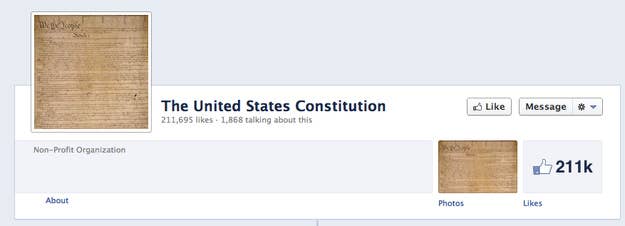
Think of all of the ways that you can express yourself in America. You can start FWD, the world's greatest tech vertical (ed: DISBARRED), or publish Hustler Magazine. You can wear a button confessing that you like Ike or donate a million bucks to a secret PAC to elect Mitt Romney. You can perform an erotic dance or publish national security information or wear a black armband in protest. You can fly your flag, burn your flag, or salute it. You can criticize the powerful, express yourself, and preach the truth. The Constitution protects all of this as free speech.
But does it protect "Liking" on Facebook? One federal judge says no.
In Bland v. Roberts, the Eastern District of Virginia ruled that "liking" on Facebook is not speech entitled to constitutional free speech protections. In that case, two civilian employees of the Hampton, Virginia Sheriff's office were fired after "Liking" the Facebook campaign page of the Sheriff's opponent in the upcoming election. Generally, firing a government employee because of his or her political speech is considered unconstitutional, but there are some exceptions, such as when the employee's speech is part of the job's duties, or if the speech sufficiently disrupts the function of the office. But the Court never even got to that point.
Instead, the Court ruled that a "Like" on Facebook, since it is just a click of a mouse, is not substantive enough to be considered speech entitled to First Amendment protection. As the Court put it:
Simply liking a Facebook page is insufficient. It is not the kind of substantive statement that has previously warranted constitutional protection. The Court will not attempt to infer the actual content of Carter's posts from one click of a button on Adams' Facebook page. For the Court to assume that the Plaintiffs made some specific statement without evidence of such statements is improper. Facebook posts can be a matter of public concern; however the Court does not believe Plaintiffs Carter and McCoy have alleged sufficient speech to garner First Amendment protection.
The Supreme Court has long acknowledged that people communicate through symbols and conduct as well as through words (see: flag burning). When evaluating whether conduct is speech, courts are supposed to ask whether a particular message is present in the conduct, and whether the people who view the conduct would understand the message being conveyed.

Now, sure, we "Like" things in all sorts of ways. I may "Like" the Real Life Pikachu because he is so adorable; or I may sarcastically "like" my friend's latest insane online dating advice. I may "Like" a photograph of my niece with Justin Bieber, because my aunt told me I have to. I may "Like" Obama's campaign page and I may "Like" Santorum's campaign page on the same day, because I think the juxtaposition will be funny in my timeline. Or maybe I'm a swing voter. If you know what I mean.
But when we "Like" something, we're certainly expressing ourselves. I am telling people that I "Like" something, and Facebook will tell my so-called friends that "Michael Phillips likes this." Some may see a double meaning; after all, I am wearing this "Like Ike" button ironically. But the message is there to be understood, one way or any other.
If the Plaintiffs appeal to the Fourth Circuit, the smart bet is that this decision will be reversed. And that is in no small part because the theoretical alternative is a nightmare.
That said, if "Liking" on Facebook is not constitutionally protected speech, I do not predict an immediate wave of government-mandated "Like" requirements and prohibitions, nor do I suspect we'll all be fired for or prohibited from "Liking" what we "Like." But that is precisely because the free speech norm is so strong, not because it couldn't happen.
As the internet creates new ways of communicating, and as Facebook becomes the internet equivalent of a public utility, the best thing we can do is make sure the Constitution follows us online.
An advocate for the Digital Age, Michael Phillips is an associate at a Wall Street litigation boutique. He has been called a “thick-haired man” by the New York Times.
